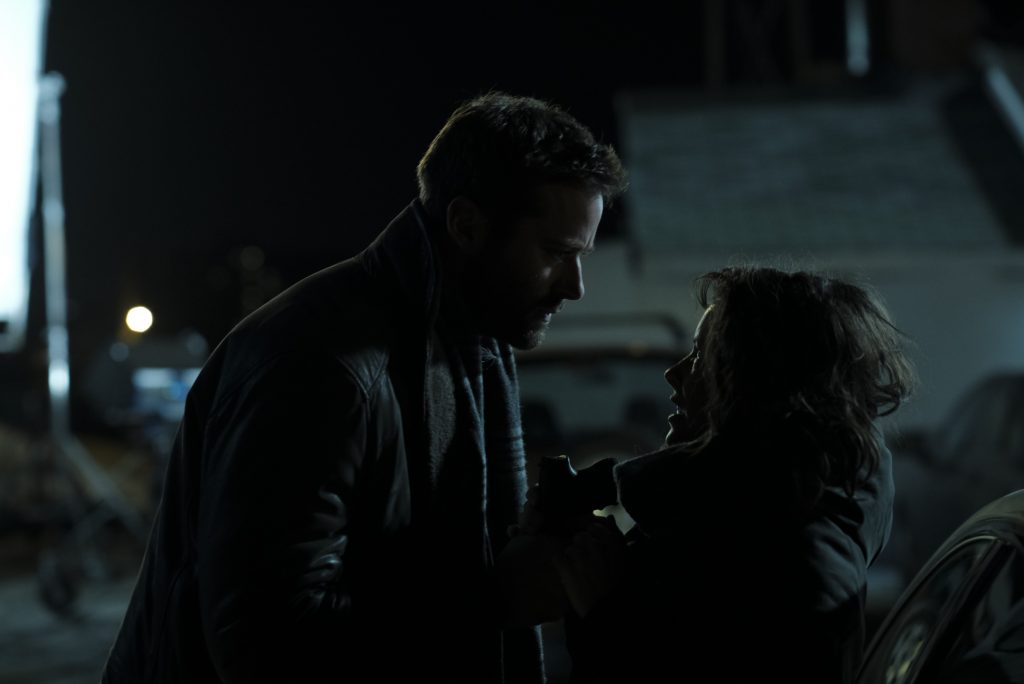March 7, 2021
by Carla Hay

Directed by Nicholas Jarecki
Culture Representation: Taking place primarily in Detroit and Montreal, the dramatic film “Crisis” features a predominantly white cast of characters (with a few African Americans, Latinos and Asians) representing the middle-class and criminal underground.
Culture Clash: The lives of three different Americans—a scientist, a Drug Enforcement Agency undercover officer and a recovering opioid addict—all collide when a new “non-addictive” opioid prescription drug called Klaralon is being rushed to market.
Culture Audience: “Crisis” will appeal primarily to people who like to watch formulaic dramas about the “war on drugs” that have some ridiculous plot developments.

It seems as if the dramatic thriller “Crisis” (written and directed by Nicholas Jarecki) was made to be a “cautionary tale” about how big pharmaceutical companies are just greedy, corporate drug dealers in the so-called “war on drugs.” However, the movie becomes so enamored with showing enmeshed storylines of the three main characters that it all just becomes a tangled mess that tries to tie up loose ends neatly in a very unrealistic way, in order to have a cliché movie ending. The acting performances are solid, but the movie’s writing and direction are bloated and messy.
The story goes back and forth between the perspectives of three Detroit people, who all end up being connected to each other in some way in the opioid crisis. It’s a crisis that has fueled demand for opioids, whether they’re sold as legal prescriptions or through the illegal drug trade. Much of the story revolves around a U.S. Drug Enforcement Agency (DEA) sting to take down a cartel of Armenian gangsters in Montreal who traffic drugs to and from the U.S. and Canadian border. You can tell already that this movie is more convoluted than it needs to be.
Dr. Tyrone Brower (played by Gary Oldman) is a scientist (presumably in biochemistry, because the movie never says), who teaches at an unnamed university in the Detroit area. This university has had a long-term business relationship with a corporate pharmaceutical company called Northlight, which has hired the university to do research on drugs that Northlight wants approved by the U.S. Food and Drug Administration (FDA). Tyrone is in charge of these research studies, and he prides himself on having high ethical standards.
Tyrone’s latest research study for Northlight is for a painkiller called Klaralon, which is supposed to be the world’s first “non-addictive” painkiller. Of course, there are caveats to using Klaralon. It’s only “non-addictive” if taken in the correct doses. And there’s some cockamamie explanation later in the story that Klaralon won’t become addictive if patients stop taking Klaralon after 30 days.
It’s an example of a poorly thought-out screenplay, because it doesn’t factor in the reality that most patients who are prescribed painkillers need to take the drugs for longer than a month. And no legitimately greedy pharmaceutical company would want to market a drug with such short-term usage. The goal would be to keep people on these drugs as long as possible to make the maximum amount of money from selling these drugs. And there are plenty of plot holes and other illogical missteps in this movie, which ruin any credibility that “Crisis” might have intended to look like a gritty drama that’s supposed to be taken seriously.
The second person in this trio of main characters is Jake Kelly (played by Armie Hammer), a hardened DEA officer who’s undercover in the Canadian city of Montreal. He’s invested a lot of time in a DEA sting to bust an Armenian gang that has been cornering the market with illegal OxyContin sales and is trying to do the same for Fentanyl. The leader of this drug cartel is named (try not to laugh) Mother (played by Guy Nadon), and his right-hand goon is named Guy Broussard (played by Éric Bruneau). “Crisis” writer/director Jarecki portrays Stanley “Stan” Foster, who is Jake’s closest and most-trusted DEA colleague in the sting.
Jake has a personal reason for wanting to bust this drug-dealing cartel: His younger sister Emmie (played by Lily-Rose Depp) is a needle-using opioid addict. During the course of the story, Emmie starts off in rehab but then ends up leaving rehab early to go back to her junkie lifestyle. You can easily predict the scene in the movie where Emmie goes missing, Jake finds her strung-out in a drug house, and he forces her to leave while she has a temper tantrum.
And speaking of drug addicts, the third person whose perspective is shown in “Crisis” is that of single mother Claire Reimann (played by Evangeline Lilly), a recovering opioid addict who’s still struggling with staying clean and sober. Claire is shown in a Narcotics Anonymous meeting, where she confesses to the attendees about her urge to use opioids and how it affects how she raises her 16-year-old son David (played by Billy Bryk).
Claire says, “I can’t even sit through a hockey game without even thinking about it. I would like to be a better person for him. And I’m working on that.” David’s father is not seen or mentioned in the movie, so it’s implied that he’s an absentee father who has no contact with Claire and David.
The university that Tyrone works for relies heavily on funding from Northlight to keep the school financially afloat. Therefore, Tyrone is under pressure to deliver lab results that will be pleasing to Northlight. However, there’s a problem with the trial studies for Klaralon. The mice that were tested in the experiments died after 10 days of being administered the drug. The trial period was extended to 30 days, and led to the same results. There’s also evidence that Klaralon is more addictive than Fentanyl.
Tyrone finds out this bad news at the worst time, because Northlight is soon going to present the university’s research on Klaralon to the FDA for approval to sell the drug. In good conscience, Tyrone refuses to lie and pretend that Klaralon is safe to sell to the general public. He meets with Northlight executives Dr. Bill Simons (played by Luke Evans) and Dr. Meg Holmes (played by Veronica Ferres), who are portrayed as soulless and money-hungry. Tyrone tells them that the drug is dangerous and not ready for FDA approval, and asks them for more time to do more lab tests.
Not surprisingly, the Northlight executives refuse and even come up with a ludicrous idea to sell Klaralon anyway. Despite all the signs that it’s a deadly drug, the Northlight executives justify this rush to market for Klaralon, by saying that the company won’t be responsible for any deaths if they include a warning that the drug cannot be taken for more than 30 days. Tyrone thinks it’s a terrible idea and isn’t afraid to say so.
After this meeting, Bill tries to entice Tyrone to sign a “modified” lab report with a “corporate donation” of $780,000. Of course, it’s really a bribe to sign a falsified report. Tyrone knows he’s being offered a bribe, but he doesn’t want to alienate Northlight, so he asks for a little more time to look over the agreement.
When Tyrone tells his boss Dean Talbot (played by Greg Kinnear) about this ethical problem, Tyrone is surprised and disappointed when the dean sides with Northlight. Dean Talbot essentially tells Tyrone that if he doesn’t sign off on the report and take the money, Northwell will cancel its contract with the university, and it will ruin the university financially.
Dean Talbot also says that just because some mice died in the lab experiments for Klaralon, that doesn’t mean that people will die from taking Klaralon too. Anyone with basic knowledge of science might be yelling at their screen at this dumb part of the movie. And the dean reminds Tyrone that the university isn’t responsible if people become addicted or die from the drugs that the university researches.
Dean Talbot also strongly hints that Tyrone will be fired if he doesn’t do what he’s told. Tyrone can’t afford to lose this job because his much-younger wife Susan (played by Mia Kirshner) is pregnant with their first child together. He’s also at an age (in his 60s) where it would be difficult to find work somewhere else. And Tyrone loves his job and doesn’t want to leave.
“Crisis” tries to do too much during its nearly two-hour running time. The story goes off the rails when tragedy strikes Claire and she turns into a vigilante. With the help of a private investigator, Claire finds out some information to try to solve a mystery. And then, she starts acting as if she’s a one-woman DEA crime-busting team. She goes back and forth between the U.S. and Canadian border. And a lot of nonsense ensues. It’s just all so ridiculously portrayed in the movie.
There are inevitable shootouts that are also badly handled in the movie. And for a powerful drug cartel led by a guy named Mother, they have a lot less people handling their business than they would in in real life. But that’s because this is a low-budget independent film, so apparently the filmmakers probably didn’t want to hire any more actors because they spent a great deal of their budget hiring an Oscar winner such as Oldman.
Oldman’s Tyrone character is supposed to be the “moral center” of the story. He’s the type of professor who tells his students: “Without us crazies, where would the world be?” As far as his big ethical dilemma about Klaralon, he might as well wear a sign that says, “Whistlebower.” Hammer and Lilly are serviceable in their roles, which don’t make much of an impression in this fairly generic movie.
Michelle Rodriguez has a small role as Jake’s DEA supervisor Mia Garrett, who doesn’t do much but scowl when she hears some of the updates that Jake gives her. Scott Mescudi, also known in real life as rapper Kid Cudi, has a much smaller role as Ben Walker, an investigator for the FDA. These two characters don’t have memorable personalities. Even the chief villain Mother is a banal stereotype of the type of elder “mob boss” that’s been seen in dozens of other crime-related dramas.
“Crisis” tries to be somewhat preachy about the far-reaching effects of the opioid crisis and the “war on drugs.” Claire is supposed to represent the “everyday person” who’s affected by this crisis. But by having her do some outlandish and very unrealistic things in this story, it actually makes her character and this movie less relatable to everyday viewers. Claire also crosses paths with Jake in some of the movie’s most preposterous scenes.
“Crisis” would have been a better movie if it focused only on Tyrone’s storyline and was a drama inspired by 1999’s “The Insider,” the Al Pacino/Russell Crowe movie about a whistleblower in the tobacco industry. “Crisis” could have been an intriguing story, because it’s rare for a dramatic movie to give an in-depth look at any corruption that goes on behind-the-scenes when drugs are being tested for FDA approval. Instead, “Crisis” overstuffs the plot with a run-of-the-mill “let’s take down a drug cartel” storyline that so many other movies have done before and done much better.
Quiver Distribution released “Crisis” in select U.S. cinemas on February 26, 2021, and on digital and VOD on March 5, 2021.
